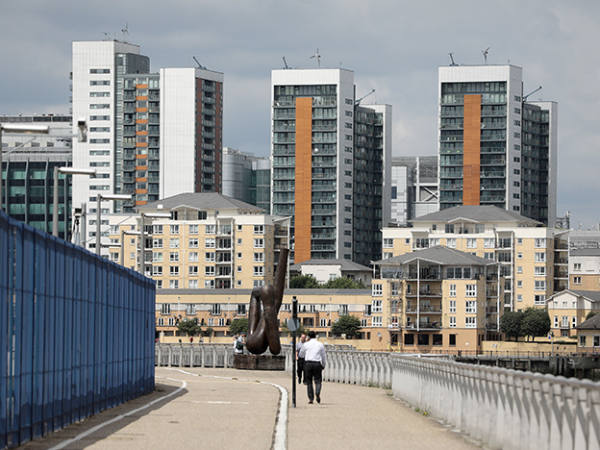- Landsec said move knocks confidence
- Euston plans are "drop in the ocean"
In quite possibly the least surprising surprise announcement ever made at a party conference, the Conservative government scrapped the northern leg of HS2 last week. Instead of running to Manchester, the high-speed railway line will now run only from London to Birmingham.
As a trade-off, the government said “every penny” of money saved would be redirected to roads, rail and buses instead. In addition, it announced a development scheme in Euston, the proposed final stop of HS2 in London, in which it said it would lean on the private sector to build the rail infrastructure alongside homes and commercial real estate on a scale similar to the redevelopment of King's Cross.
Some of the loudest disapproval over the decision came from the very property industry the government was attempting to woo with its Euston announcement. Many worry the move will put off investors as the industry struggles to recover from the real estate downturn – although some in the sector do agree with the decision.
Cancelled investment
“As a major investor in Manchester, we’re disappointed that HS2 will not continue as planned to the city,” said Mark Allan, chief executive of Landsec (LAND). Indeed, Manchester accounts for a lot of the company's future development (see chart). The bulk of its work there is the £1.5bn Mayfield project, where it hopes to deliver a “sustainable community” featuring 1,500 homes, over 200,000 square feet of retail and leisure space, and a 650-bed hotel.
Allan said the decision to stop HS2 at Birmingham signalled a bigger problem. “More broadly, we’re concerned about what the cancellation says about our ability, or lack of, as a country to deliver major infrastructure projects. It is now very difficult for any investor – domestic or international – to have confidence in our ability to deliver what we say we’re going to deliver.
“If we want to boost investment into the economy, spread growth around the country and deliver a better quality of life for people living and working around the UK, we need to change the way we get things done.”
Landsec was not the only listed developer to go public with its concerns. An open letter signed by dozens of businesses and business groups – including British Land (BLND) and Henry Boot (BOOT) – said the “repeated mixed signals on HS2 [...] are damaging the UK’s reputation as a place to do business”. It added: “they are also damaging the country’s wider supply chain, as spending commitments cannot be made with confidence.”
The latest decision, coupled with the steps now being taken to sell off properties that were originally subject to compulsory purchase orders (CPOs) to make way for the route, suggests little room for further changes of heart – whichever party is in power – which should at least mitigate some of these worries.
But other concerns, such as those around “spending commitments” and the lack of “domestic or international investor confidence” highlighted by Landsec, are more persistent and are echoed by others in the industry. Developers, particularly real estate investment trusts (Reits), depend on investment to develop buildings. This is often through debt (see table), sometimes through equity, but rarely through ready cash. Higher interest rates and a depressed market for property investment means money is harder to come by, and the cancellation of HS2 could make it harder still.
“There will be people who made early investments in the expectation that HS2 will go to Manchester,” John Cahill, a real estate analyst at Stifel, told Investors’ Chronicle. “Even in the best case scenario, that was at least a decade if not more away, so there shouldn’t be too much loss of value there. But the bigger issue [for investment] is: Can you trust anything the UK government says? The answer was already ‘no’ and now it’s a firm ‘no’.”
| UK LISTED PROPERTY COMPANIES RANKED BY TOTAL DEBT TO TOTAL EQUITY | |||
| Name | Market cap (£mn) | Total debt to total equity (%) | Debt/Ebit ratio |
| Capital & Regional (CAL) | 126 | 118 | 7.10 |
| Regional Reit (RGL) | 140 | 111 | 6.10 |
| Residential Secure Income (RESI) | 113 | 110 | 13.5 |
| NewRiver (NRR) | 243 | 98.6 | 10.6 |
| CLS Holdings (CLI) | 445 | 90.9 | 14.6 |
| Primary Health Properties (PHP) | 1,210 | 87.9 | 8.00 |
| Sirius Real Estate (SRE) | 990 | 83.9 | 9.70 |
| Assura (AGR) | 1,234 | 78.9 | 10.0 |
| Grainger (GRI) | 1,766 | 69.2 | 11.30 |
| Tritax EuroBox (EBOX) | 392 | 65.8 | 19.30 |
| Hammerson (HMSO) | 1,226.70 | 65.5 | 126 |
| Source: FactSet | |||
Others have more specific concerns. Two weeks ago, Jefferies real estate analyst Mike Prew released a bearish note about the state of the London office market and how it negatively affects the likes of British Land, Land Securities, Derwent (DLN) and Great Portland Estates (GPE). In a follow-up last week, he said most of his clients see regional office markets as “more vulnerable” than London and added there was “some debate as to the risk of HS2 being unfinished” for those markets.
If cutting HS2 culls regional connectivity, it would add to regional offices' myriad other downsides – such as the cost needed to retrofit them to meet green energy standards and the open question about office demand post-Covid. It would be bad news for companies such as Regional Reit (RGL), which as its name partly suggests has a portfolio of regional offices.
'Euston, we have a problem'
Many are also critical of the proposed substitutes for HS2. In London, the government has pledged to bring private sector developers into a development corporation to build on vast swathes of land around Euston station. It said this “will potentially offer up to 10,000 homes” and “a huge expansion of commercial and laboratory space”. The government added this would generate £6.5bn in business rates and developer contribution income for the public purse.
Critics pointed out that the plans amount to handing responsibility for the infrastructure from the public to the private sector; the government has refused to confirm whether or not the Euston scheme would go ahead if the private sector did not back it. In addition, Alistair Watson, planning partner at law firm Taylor Wessing, told the Financial Times that the press-released figures announced do not stand up to scrutiny. “It’s a headline, but it's a little bit cheeky and a little bit foolish because it depends upon the development scale, it depends upon construction costs, it depends upon [...] lots of things that the government cannot control.”
A private sector opportunity may sound like good news for commercial real estate players, but Stifel’s Cahill was also critical of the Euston announcement, suggesting there is nothing new for Reits or housebuilders. He observes that the original plan was for a stop in Euston anyway and that private development on the surrounding land was always a given. More than that, his frustration is that it pales when compared with the development opportunities a full HS2 would have opened up. “10,000 homes is a drop in the ocean in one borough, never mind the whole of London,” he said. “It’s run of the mill delivered by the industry already.”
Despite the aforementioned sell-off plans, there are still concerns about the property and land the government had already snapped up through CPOs on what would have been the Birmingham to Manchester leg of the route. Homeowners and small businesses who were obliged to sell up are not the only ones who will be feeling frustrated. Derwent London’s site at Hampstead Road near Euston came under threat in 2012. After five years of wrangling, it agreed to sell the site to the government for £130mn in 2017, but it was far from jubilant.
“The offices were designed as Derwent London’s first White Collar Factory development, the same concept that is now being successfully delivered at Old Street Yard EC1, and had attracted considerable pre-letting interest,” it said in a statement at the time. “However, these plans were unable to be carried forward by the decision to build HS2 announced in 2012. The December 2016 book value, which did not reflect the full benefit of the very valuable planning consent, was £115mn.”
The subsequent sale of government-owned property along the original HS2 route may similarly struggle to achieve optimum prices, given the hurried nature of the sales, and the fact that the commercial real estate market is far weaker than it was when base rates were at zero. In theory, that could create opportunities for bargain hunters, but analysts like Cahill maintain that these advantages will also struggle to match up to the potential benefits of HS2 itself – however long it would have taken to actually complete the original route.
Not all are downbeat, however. Neil Sinclair, former chief executive of Palace Capital (PCA), is more optimistic than many in his industry about the potential opportunities. He broadly agrees with the government’s bullish description of the scale of the Euston project and believes it could boost the London office market. He describes Euston, with its proximity to Kings Cross, as “a very good office location”.
Sinclair says the plans to spend money on northern bus, rail and road infrastructure instead of HS2 could also be a good thing. As a seasoned investor in regional commercial real estate, he has long heard complaints about the lack of local transport options in regional towns and cities. If the government can solve that, he thinks commercial and residential property markets in the UK’s smaller towns and cities would benefit. “But it’s got to be a firm commitment,” he added. “It can’t be back of the fag packet stuff.”












